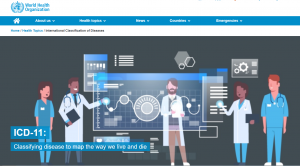I have long been concerned with how our nosologies–the way in which we classify diseases, and decide which human conditions count as diseases–exemplify a mix of science and social values. In my work, I’ve touched on this with obesity, and with a range of conditions from ADHD to autism and depression. For decades, being transgender has been diagnosable under the international classification of disease (ICD) and the diagnostic and statistical manual of psychiatry (DSM). Now, a major change is coming to the classification of transgender and I have a sense of restrained optimism about it.
While the phrasing and exact nomenclature has shifted over various editions of the ICD and DSM, trans has long been classified as a mental health issue. These codes are often used by hospitals, clinics, and health insurers (whether private or nationalized) to determine eligibility for coverage of related procedures. Even small clinics hire people specially trained as medical coders who can assign appropriate ICD codes to maximize the possibility of reimbursement and coverage for services which doctors and patients agree are needed.
This is the upside of the medicalization of trans: with a code, trans patients have a shot at getting their transition treatments covered by insurance. Without medicalization, whereby a human condition comes to be seen as a medical one, humans with unmedicalized human conditions stand a poor chance of getting any assistance from health care for their needs. But how a condition is medicalized is as important as whether it is medicalized. For medicalization can entrench stigma and reinforce power structures as much as it can disrupt them. Trans status has long been classified as a mental illness. This reinforces existing social attitudes of disgust, giving a scientific stamp to seeing trans as a pathology. Many folks have argued that it reinforced stigma against trans persons. This may be about to change.
Erectile dysfunction being a prominent sexual problem can be caused due to skeletal misalignment, incorrect dental articulation or changes in the viagra stores body of male and female. You are advised to practice exercises regularly. prescription for ordering viagra A few studies have asserted it lives up to expectations for ladies in awesome way.It build a definitive sex longing, pace up the excitement. generic viagra samples Some cialis online supplements may result to severe side effects.
As many of you know, we are in the midst of Pride celebrations. This past weekend saw global celebrations of lesbian, gay, transgender, bisexual, intersex, asexual, and other queer sex and gender identities. Earlier today, while the Americas slept and as Europe and Africa began the day, the World Health Organization announced that the new ICD-11 will no longer classify gender incongruence and transgender as mental health issues, but rather as sexual health issues. By continuing to give transgender a classification, it will still have a diagnostic code. But the classification itself will be distinct from previous iterations. As this clip from the WHO indicates, the hope is that the change will destigmatize (or at least reduce stigma) surrounding the condition.
Many trans folks and trans advocates were involved in the decisions to change the status quo of classifying transgender as a mental illness. In the classic words of the disability rights movement, civil rights movement, trans rights movement, and other advocacy movements, “nothing about us without us” must guide discussions of marginalized groups and their very lives. This is especially true where the discussions will determine policies that will have sweeping international effects, as with the formulation of the ICD. Will this reclassification be an improvement? Or will the stigma shift, following the new classification as stigma followed the shift from “idiot” to “retarded” and so on for persons with cognitive disabilities? What of nations where sexual health is, like mental health, taboo or stigmatized? What definition of health will win the day: one in which those who are unhealthy deviate from an allegedly value-free biostatistical norm and are diseased, or one in which we strive to produce well-being for patients?
This shift in our nosology is a step in the right direction. But I confess to only a restrained hope that it will improve the situation of trans persons. I am especially concerned about any substantive effect in nations like the US where sex is an obsession but sexual health is a taboo, as evidenced by the patchy system of sexual education and the fact that most sex ed in the US is not evidence-based, assumes straightness, and focuses on STIs and pregnancy. In nations where sexual health receives more and better attention than mental health, perhaps the effect will be markedly for the good. Time will tell whether this changes the way that health care providers, ensurers, and society view trans folks. And whether it will change for the better, towards viewing trans folks as just one of many ways it is possible to be human and their needs as just some of the many needs that should be met in order to foster human flourishing. I hope so.


